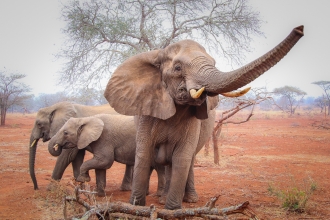
Debunking Africa’s ‘resource curse’
Not all economists buy into the notion of the ‘resource curse’ - namely, that resource-rich countries end up with slower growth and stalled development, in spite of having bankable natural assets…

Not all economists buy into the notion of the ‘resource curse’ - namely, that resource-rich countries end up with slower growth and stalled development, in spite of having bankable natural assets…

Natural spaces within city limits, such as wetlands or forests, can offer important support to cities in terms of helping to manage waste water, or slow down flood waters. But scientists shouldn’t…

The beautiful Kogelberg coastline - a 100 km long stretch of towering mountains and craggy beaches about an hour’s drive east of Cape Town - and its surrounding tourist attractions are estimated to…

Zimbabwe’s community-based conservation approach, which brings together peasant farmers in a tourism-focused approach to wildlife management, has not curbed poaching along the edge of protected areas…

Newly appointed professor Edwin Muchapondwa has travelled a long way since he left his home town of Bindura, near Harare, when he was eight years old. Over three decades later, the conservation and…
This paper uses a bioeconomic model to analyse wildlife conservation in two habitats adjacent to a national park by two types of communities in the context of Southern Africa. One community is made up of peasant farmers operating under a benefit-sharing scheme (CAMPFIRE) while the other is made up of commercial farmers practising game farming in a conservancy (the Save Valley Conservancy). Both communities exploit wildlife by selling hunting licenses to foreign hunters but with different levels of success.
Extant literature on Joint Forest Management (JFM) impact evaluation has concluded that it generally does not provide sufficient incentives to justify the costs that forest use restrictions impose on local people. However, there is a dearth of evidence concerning whether alternative JFM intervention with improved market linkages for non-timber forest products has similar implications. In this study, we evaluated the income and distributive effects of a JFM program in Ethiopia in which additional support was provided for improved market linkages for non-timber forest products (NTFPs).
This study used a sample of 336 households and community-level data from 30 communities around Gonarezhou National Park in Zimbabwe to analyse the association between institutions and cooperation (defined as the ability to self-organise) and the relationship between cooperation and success of biodiversity outcomes.
The objective of the project is to assess the economic ramifications of conservation activities in the Greater Addo region. This is the core of much Eastern Cape tourism as well as much of the
Research is required to determine the value of sustainable resource use, and its associated cultural and spiritual values to the Khomani San, linked to a reconnection with the land, and relative to